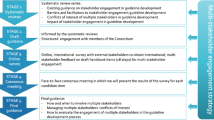Abstract
With the rapid development of genetic research and applications in health care there is some agreement among funding and regulatory bodies that the public(s) need to be equipped to deal with the choices that the new technologies will offer them, although this does not necessarily include a role for the public in influencing their development and regulation. This paper considers the methods and purpose of public consultations in the area of genetics including large-scale surveys of opinion, consensus conferences and focus groups. Consultation has been undertaken to enable the researchers/policy makers to see what the public do not know and plan more public education to make up the deficiency, to check on areas of concern so that public education can be used to address them or to gain a public mandate for a planned policy. An alternative and more recent approach is to find out what the public(s) do know and understand and to see how experts can learn from them in order to get a fuller view of technology in use.
Similar content being viewed by others
REFERENCES
BBC (2002) Hot Topics—Intelligence-Nature or Nurture? http://www.bbc.co.uk/science/ hottopics/intelligence/clever.shtml 18/6/02
Barns, I. (1996) Manufacturing consensus: reflections on the UK national consensus conference on plant biotechnology. Science as Culture 5:2 no.23 pp. 199-216.
Campbell, A. (1995) Consensus conferences and expert meetings in Bioethics Research. Gindro, S., Bracalenti, R. and Mordini, E. (eds) Bioethics Research: Policy, Methods and Strategies. Proceedings of a European Conference. Roma, 23–25 November, pp. 107-112.
Chadwick, R., et al. (1998) Cultural and social attitudes to biotechnology: analysis of the arguments with special reference to the views of young people. Directorate-General Science, Research and Development. European Commission.
De Vries, R. and Conrad, P. (1998) Why bioethics needs sociology. R. DeVries and J. Subedi (eds). Bioethics and Society. Constructing the ethical enterprise. New Jersey: Prentice Hall.
Durant, J. (1998) Biotechnology in the Public Sphere. London: Science Museum.
European Commission (1996) Eurobarometer 46.1 Report.
European Commission (1998) Eurobarometer 52.1 Report. Question 4.
Franklin, S. (1999) What we know and what we don't about cloning and society. New Genetics and Society 18.1 pp. 111-120.
Grove-White, R., et al. (1997) Uncertain World: Genetically Modified Organisms and Public Attitudes in Britain, Lancaster: Centre for the Study of Environmental Change, Lancaster University.
Hampel, J. and Renn, O. (Eds.) (2000) German Attitudes to Genetic Engineering. Special Issue New Genetics and Society 19(3).
Human Genetics Commission (2001) Public attitudes to human genetic information. People's panel quantitative study conducted for the Human Genetics Commission. London: HGC.
Jallinoja, P. and Aro, A.R. (1999) Knowledge about genes and heredity among Finns. New Genetics and Society 18(1), pp. 101-110.
Kerr, A., et al. (1997) The new genetics: Professionals' discursive boundaries. Sociological Review pp. 278-303.
Kerr, A., et al. (1998) Drawing the line: an analysis of lay people's discussions about the new genetics. Public Understanding of science 7, 113-133.
Levitt, M. (1998) The Gene Shop. Evaluation of a Public Education Facility. Preston: University of Central Lancashire.
Lloyd, I. (2000) The tyranny of the L-shaped curve. Science and Public Affairs Feb. 2000 pp. 14-15.
Marteau, T. and Richards, M. (eds) The Troubled Helix Cambridge: Cambridge University Press pp. 63-81.
Pfister, H-R., et al. (2000) The cognitive representation of genetic engineering: knowledge and evaluations. New Genetics and Society 19(3), 295-316.
Purdue, D. (1999) Experiments in the governance of biotechnology: a case study of the UK National Consensus Conference. New Genetics and Society 18(1), 79-99.
Ratcliffe, M. (c.1997) Teaching Ethical Aspects of Science—Evaluation of Case Studies. Unpublished report of the Science Ethics and Education Project, Research and Graduate School of Education, University of Southampton.
Royal Society (1992) Risk: Analysis Perception and Management. London: The Royal Society.
Science Museum (1994) UK National Consensus Conference on Plant Biotechnology. Final report. London: Science Museum.
Stratford, N., et al. (1999) Tailoring Genes. Jowell, R., et al. (eds) British Social Attitudes. The 16th Report. 1999–00 Edition. Aldershot: Ashgate Publishing. Chapter 8.
Voss, G. (2000) Report to the Human Genetics Commission on Public Attitudes to the Uses of Human Genetic Information London: Human Genetics Commission.
Wellcome Trust (1998) Public perspectives on human cloning. London: Wellcome Trust.
Wellcome Trust & Medical Research Council (2000) Public Perceptions of the Collection of Human Biological Samples. London: Wellcome Trust & MRC.
Wellcome Trust (2001) Valuable Lessons: Engaging with the social context of science in schools (available on website www.wellcome.ac.uk).
Welsh Institute for Health and Social Care (WIHSC) (1998) Report of the Citizens' Jury on Genetic Testing for Common Disorders. Pontypridd: University of Glamorgan.
Wilkie, T. (1998) Navigating the moral maze: The bioethics programme Wellcome News 14Q. London: Wellcome Trust (Website: www.wellcome.ac.uk).
Rights and permissions
About this article
Cite this article
Levitt, M. Public Consultation in Bioethics. What's the Point of Asking the Public When They Have Neither Scientific nor Ethical Expertise?. Health Care Analysis 11, 15–25 (2003). https://doi.org/10.1023/A:1025381828650
Issue Date:
DOI: https://doi.org/10.1023/A:1025381828650



